Two decades ago, South Korean company Celltrion embarked on a quest to find the necessary resources to produce biopharmaceuticals. It took five years for their manufacturing plant to receive GMP certification from the US FDA in 2007 and another one to launch an initial public offering; an ascent that, while swift, was not unheard of. However, this changed when Celltrion was able to launch the world’s first antibody biosimilar.
When European regulators approved Celltrion’s infliximab biosimilar (Remsima) in 2013, a new era for a young industry began, validating heavy investments, opening the doors to the USD 6+ billion global market that the reference brand, Janssen’s Remicade, had at the time.
Illustrating the contrasting European and American regulatory approaches to biosimilars, approval for Remsima in the US had to wait almost three years. But commercialization milestones have followed in a cascade effect ever since, first with alternatives for two of Roche’s best-selling oncology drugs, and later with another for the world’s best-selling drug, Abbvie’s Humira.
“Celltrion is a true pioneer in biosimilars. Our objective at the moment is to launch at least one product per year… The company so far has been able to position itself as a leader and innovator because it has its own integrated in-house process that covers all areas of development,” says SeokHoon Kang, the company’s general manager for Turkey, a country where Celltrion maintains a fill-and-finish plant for Remsima and Herzuma (trastuzumab, biosimilar to Roche’s Herceptin).
An unexpected COVID player
Not regarded as an innovative healthcare company outside of a biosimilars context, Celltrion made global headlines in October 2020 when it received FDA emergency use authorization for its rapid COVID-19 test; the US federal government eventually agreed to a USD 626 million purchasing deal with Celltrion. “[The company] believes the demand for rapid diagnosis kits will be high, mainly among large businesses and government agencies that are about to return to work after telecommuting,” it ventured in a statement.
Unbeknownst to the industry at the time, diagnostics was only part of the Korean company’s grand pandemic ambitions, with monoclonal antibodies joining vaccines as the two most important weapons in the global fight against the virus.
Almost one and a half year had passed since European regulators had authorized a COVID-19 treatment (Gilead’s Remdesivir) when, in late 2021, Celltrion received approval for their monoclonal antibody Regkirona for use in adults with COVID-19 who do not require oxygen support and are at high risk of severe disease. The product accounted for 17 percent of the company’s global sales in the last quarter of 2021.
Humira Time
Although unable to top the global drug sales leaderboard three years in a row, Abbvie’s Humira (adalimumab) got back on track in 2021 with USD 20 billion in annual sales. The blockbuster monoclonal antibody has long been a key revenue driver for AbbVie, but the company has already pointed to biosimilars as formidable competitors outside of the United States.
An expert in that product category, Celltrion has already secured approval for its biosimilar Yuflyma in Europe. Compared to other players, Celltrion has obtained the green light for both lower- and higher-concentration versions; adalimumab is used to treat patients with multiple chronic inflammatory diseases, such as rheumatoid arthritis and psoriasis. According to recent financial disclosures, the Korean company cashed in around USD 134 million from the drug.
Counting only its phase III pipeline, Celltrion is set to launch biosimilar competition for five best-selling biologic drugs: Xolair (omalizumab, Roche/Novartis), Avastin (bevacizumab, Genentech), Prolia (Amgen), Stelara (ustekinumab, Janssen) and Eylea (aflibercept, Regeneron/Bayer).
This article is featured in InFocus: Biosimilars 2022, available for free download here



